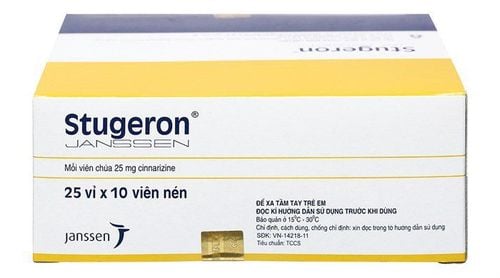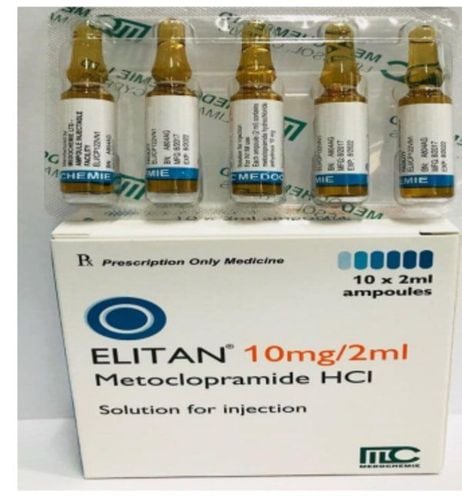Nautamine is a medication used for the prevention of nausea and vomiting, particularly associated with motion sickness. It is also known as diphenhydramine, an antihistamine drug that can be administered to both adults and children over the age of two.
1. Antiemetic Medication Nautamine
Nautamine, also known as diphenhydramine, is an antihistamine antiemetic. This medication is suitable for use in both adults and children over 2 years of age.
The composition of Nautamine includes diphenhydramine and excipients such as sodium starch glycolate, sodium lauryl sulfate, and magnesium stearate.
Its antiemetic effect is primarily due to the competitive inhibition at the H1 receptor by diphenhydramine. Additionally, this component exhibits strong anticholinergic activity and notable sedative effects, leading to sedation as a frequently reported side effect.
Motion sickness resulting in nausea and vomiting can affect not only passengers but also drivers. A pertinent inquiry arises regarding the suitability of Nautamine for drivers experiencing motion sickness. Due to its sedative properties, Nautamine is likely to induce drowsiness, impair memory, cause dizziness, and diminish concentration. These effects may be exacerbated in elderly individuals or in those consuming alcohol or other alcoholic beverages concurrently. Consequently, caution is advised, and individuals should consult a healthcare provider prior to driving or consider alternative antiemetic medications or an appropriate dosage adjustment of Nautamine.
Aside from sedation, Nautamine may lead to other adverse effects including:
- Decreased alertness, hallucinations, and visual disturbances.
- Hypotension and tachycardia accompanied by palpitations.
- Anxiety and a persistent sense of restlessness.
- Allergic dermal reactions such as rashes, urticaria, angioedema, and anaphylaxis in cases of hypersensitivity to the components of the medication.
- Leukopenia and thrombocytopenia may also occur.
Nautamine is well absorbed when taken orally.
- Dosage of Nautamine for the prevention of motion sickness:
- For adults and children over 12 years: Take 1-1.5 tablets per dose, not exceeding 6 tablets per day, repeat dosage every 6 hours if needed.
- For children aged 6 to 12 years: Administer 1 tablet per dose, not exceeding 4 tablets per day, repeat dosage every 6 hours if needed.
- For children aged 2 to 6 years: Administer 1/2 tablet per dose, not exceeding 2 tablets per day, repeat dosage every 6 hours if needed. Note: For young children, it is advisable to crush the tablet and mix it with water before administration.
2. Indications, contraindications of Nautamine and precautions when using the medication.
Indications for Nautamine include treatment for motion sickness.
Contraindications for Nautamine include:
- Patients diagnosed with glaucoma.
- Individuals who are allergic to any of the medication's constituents.
- Patients currently using enoxacin, and breastfeeding women should avoid use due to the potential for excretion through breast milk. If necessary, medical consultation is advised.
- Patients experiencing urinary retention due to prostatic hypertrophy.
- Nautamine should not be administered to children under the age of two, particularly in neonates and preterm infants, due to the risk of stimulation leading to toxicity, seizures, hallucinations, or even death.
For the safe and effective use of Nautamine in the treatment of motion sickness, it is essential to observe the following recommendations:
- The optimal time to administer the medication is 30 minutes prior to departure.
- Nautamine should be taken with an adequate volume of water, neither excessive nor insufficient.
- Dosage should be adhered to according to age recommendations.
- Individuals with a medical history pertaining to renal or hepatic conditions should inform their treating physician to allow for appropriate dose modification.
- Due to potential side effects such as constipation, drowsiness, and dizziness, caution is required when prescribing to the elderly.
- Caution should also be exercised in patients at risk for prostatic disease.
- In cases of overdose, particularly when combined with alcohol or phenothiazine medications, immediate medical consultation is required.
- The medication can be prescribed during pregnancy but only under the guidance of a healthcare provider. Consumption of alcohol or stimulants should be avoided while using this medication as it may exacerbate its side effects.
- Pregnant women should seek medical advice before use due to the potential for transplacental passage of the drug.
- Patients should not self-prescribe in combination with other antiemetics or antihistamines.
Nautamine is a commonly utilized antiemetic medication that is suitable for both the elderly and children. However, it is contraindicated in children under two years and in breastfeeding women. Given its sedative side effects, careful consideration is required when administering this medication to individuals engaged in driving or operating machinery. Consultation with a healthcare provider is recommended for those seeking to use Nautamine to mitigate motion sickness.
Please dial HOTLINE for more information or register for an appointment HERE. Download MyVinmec app to make appointments faster and to manage your bookings easily.
To arrange an appointment, please call HOTLINE or make your reservation directly HERE. You may also download the MyVinmec app to schedule appointments faster and manage your reservations more conveniently.








